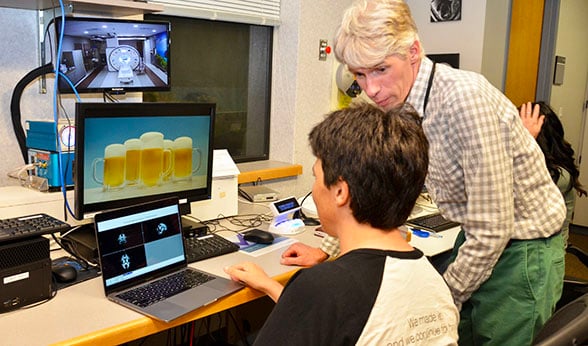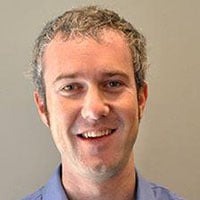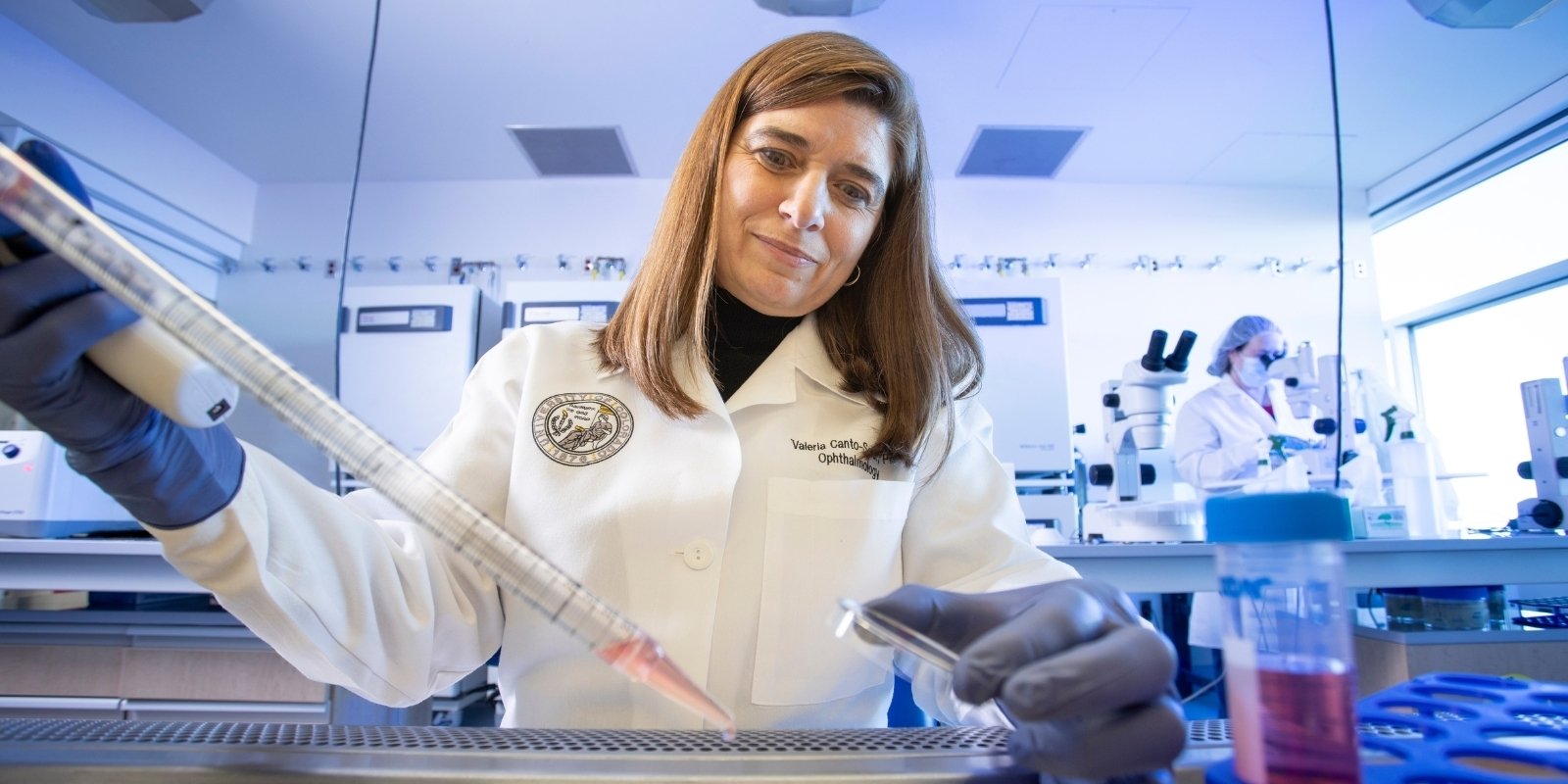As the nation reels from a substance abuse crisis that’s shattering lives every day, scientists and clinicians across the University of Colorado Anschutz Medical Campus work diligently in their labs and clinics, hoping to prevent tragedies of addiction.
While fentanyl and heroin deaths inundate the headlines and have the research campus’s attention, another longstanding killer is taking a growing number of lives. Alcohol use disorder (AUD) claims 95,000-plus Americans each year, with deaths jumping 25% from 2019 to 2020. The largest increase in fatalities was among 25- to 44-year-olds.
Struck early in his career by how addictive and pervasive drinking was, Joseph Schacht, PhD, an associate professor in the Division of Addiction Science, Prevention and Treatment at the CU Department of Psychiatry, has made averting the toll of alcohol toxicity a chief focus.
“You talk to people clinically, and they know that it’s bad, that it’s hurting them, and yet they can’t stop doing it,” said Schacht, a licensed clinical psychologist and principal investigator in the Translational Addiction Imaging Lab (TrAIL) at CU Anschutz. “I found that really compelling. I felt like I wanted to make a difference clinically in helping people like that.”
With statistics suggesting half of all American families have at least one member with AUD, Schacht’s target group is large. “Everybody knows someone affected by alcohol or is affected themselves.”
For Schacht and his colleagues across the academic medical research campus – which is home to CeDAR (UCHealth’s Center for Dependency, Addiction and Rehabilitation), the top-rated recovery center in the state – science holds many of the answers.
Leveraging science in recovery
Also a clinical neuroscientist, Schacht combines psychology and neuroscience in his search for novel drugs aimed at curbing alcohol use. “Unfortunately, there has not been any big progress on that front,” Schacht said, noting the last Food and Drug Administration approval of such a medication was in 2006 and that the three drugs available don't work for everybody. “We need better treatments and more of them.”
Scientists today have an advanced biological understanding of AUD, a term adopted by the medical field to underscore that alcoholism is a disease, not a character flaw. With better tools and an abundance of data at their fingertips, researchers are focusing on recovery techniques with a more personalized, technology-driven approach.
In Schacht’s lab, for example, NIH-funded researchers compare before-and-after scans of trial participants’ brains, searching for evidence that their experimental drugs are working based on their knowledge of the AUD brain.
Once people develop AUD from excessive drinking, their brains become more sensitized to alcohol’s mood-altering “rewards” and to things associated with drinking (bars, parties, frothy beer mugs, etc.). Schacht’s team monitors this “alcohol cue reactivity” by scanning study participants’ brains while showing them alcohol-related pictures.
Brain changes trigger AUD behaviors
“What we find is consistent with research from many other animal-model studies that indicate that the parts of the brain that process reward are hyperactive in the AUD brain. So it’s kind of primed to respond to things that predict alcohol.”
An AUD brain also becomes smaller over the years, losing critical functions, particularly in the prefrontal cortex, Schacht said, referring to the part of the brain largely responsible for behavioral control.
“So there is this big reward signal that says, ‘That looks good. Go get that.’ And then you have this diminished control system that is not able to say, ‘Don’t do that, because you need to go pick up your kids at school, or because you need to be able to go to work in the morning,’” Schacht said. “So it’s like the gas is getting hit too hard, and the brakes are failing.”
Personalizing the recovery approach
In his lab in the new Anschutz Health Sciences Building (AHSB), Schacht’s team tailors experimental drugs to those neurological differences. Two of the drugs being tested at the Colorado Clinical and Translational Sciences Institute in the AHSB are aimed at making alcohol less rewarding. “They’re intended to kind of take the foot off the gas pedal a little and make you want alcohol less.”
With one of those drugs, the scientists are taking a “pharmacogenetic approach,” personalizing treatment by identifying a specific genetic subgroup of people for whom the drug should be most effective.
Long-term health risks of excessive alcohol use
|
A third drug targets improved control and is also being tested in participants with ADHD (attention deficit hyperactivity disorder), as scientists work to learn more about the bi-directional relationship of AUD and other mental health disorders.
“Having AUD increases the risk of many other psychiatric disorders: depression, anxiety, ADHD,” Schacht said. Conversely, having those mental health disorders increases the risk for AUD and other substance use disorders, with the risk two- to four-fold higher in people with ADHD, he said.
Importance of science-based care
Schacht’s research is one example of the recovery-related science and innovation taking place at the CU Anschutz campus – science that translates into classrooms and clinics, changing the course of substance-use recovery.
“We are an academic medical center,” said Patrick Fehling, MD, an associate clinical professor of psychiatry and a psychiatrist at CeDAR, nationally recognized for its inpatient and outpatient treatment programs for all substance-use disorders.
As the largest such center in the region, CU Anschutz provides patients strategized, science-based care in a setting that meets every medical need “right across the street,” Fehling said.
CeDAR’s full-time onsite staff of doctors, nurses, medical fellows and students take advantage of those resources and offer progressive care that meets current research and trends.
“We are currently building a really cutting-edge protocol for liver transplant recipients,” Fehling said. Alcohol use has surpassed hepatitis, becoming the No. 1 cause of liver transplants today. Many of those patients, especially last year, were in their 20s and 30s.
“After they get stabilized here, they will get a transplantation, and then they will come back and live in our program for a couple months for alcohol recovery treatment,” Fehling said.
Research today covers all stages of recovery, potentially easing the life-long journey and curbing the toll alcohol can take on people’s health. “That’s the goal,” Schacht said. “We’re hoping to catch people before they get to that point and intervene.”
Other promising areas of research for recovery include:
Neuromodulation: Studies on noninvasive neuromodulation, including transcranial magnetic stimulation (TMS), are common in treatment research for substance use disorders, with TMS already FDA-cleared for smoking cessation therapy. Invasive neuromodulation, or deep-brain stimulation used for Parkinson’s disease and able to target structures deep in the brain, has shown early promise. Joseph Sakai, MD, an associate professor in the psychiatry department and clinician in the TMS Clinic at CU Anschutz, recently received a grant to study deep-brain stimulation for methamphetamine addiction.
Cannabis: Kent Hutchison, PhD, a professor of psychiatry, is the primary investigator of a study with Schacht testing whether increasing cannabidiol levels in people who already use cannabis can help them reduce alcohol use. Pre-clinical studies suggest cannabidiol, a non-psychoactive component of cannabis, has a reduced-craving effect. The researchers are also preparing for a study testing cannabidiol as an aid in helping people who want to cut down on their cannabis use.
Smart device technology: Computational tools, wearable devices and mobile technology have generated many studies in healthcare, including for long-term substance-use recovery. In the Peters Mile High Lab for Emotional Wellness and Addiction Recovery on campus, for instance, researchers are studying devices that offer guided breathing exercises to help people maintain emotional wellness and prevent physical relapse triggers. Devices that identify spikes in blood pressure and sweating, for example, are also being studied to help predict high-risk moments of relapse, leading to quicker intervention.
To participate in a TrAIL alcohol study, call (303) 724-2424 or email alcoholstudy@ucdenver.edu. Check the CU Anschutz research studies page for more trials.





